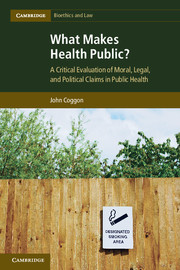 What Makes Health Public?
What Makes Health Public? Book contents
- Frontmatter
- Contents
- Foreword
- Acknowledgements
- What makes health public?
- Part I Basic concepts in public health
- 1 Health, normativity, and politics
- 2 The public, and things being public
- 3 The seven faces of public health
- 4 Public health policy
- 5 Public health law and ethics
- 6 Conclusion to Part I
- Part II Evaluating evaluations: making health public
- Part III Tackling responsibility: liberal citizens as subjects and sovereigns
- Bibliography
- Index
- References
3 - The seven faces of public health
from Part I - Basic concepts in public health
Published online by Cambridge University Press: 05 June 2012
- Frontmatter
- Contents
- Foreword
- Acknowledgements
- What makes health public?
- Part I Basic concepts in public health
- 1 Health, normativity, and politics
- 2 The public, and things being public
- 3 The seven faces of public health
- 4 Public health policy
- 5 Public health law and ethics
- 6 Conclusion to Part I
- Part II Evaluating evaluations: making health public
- Part III Tackling responsibility: liberal citizens as subjects and sovereigns
- Bibliography
- Index
- References
Summary
Introduction
Having considered in Chapters 1 and 2 the meanings of ‘health’ and ‘public’, it is now possible to come to definitions of ‘public health’ itself. As above, I will set out my reasons for preferring particular definitions: in short, I think it is most usefully taken to refer to instances where there are known but not individually identifiable people whose health is affected by a policy or practice, or used as a shorthand in reference to facts about people’s health within or between populations. Nevertheless, it is also important to consider and keep in mind other prevalent understandings that feature in academic, professional, and public discourse. Public health has such varied meanings that its uncritical or uncontemplated use in debate can lead to obscure arguments. Although these are easily overcome through clarification, the plurality of meanings of ‘public health’ itself, as well as those of ‘public’ and ‘health’, mean analysis is often more cumbersome than it might otherwise be. As the salient questions for normative debates about public health are political, it will be unsurprising that the term ‘public health’ can itself come to be used as a powerful political device in social argument, and more narrowly it can be set up as something with a central mission, code, values, and perspective. I will discuss below the risk of allowing pre-analytic normativity to enter concepts of public health, where it looks like so doing will unduly direct the debate.
This chapter presents in detail what I call ‘the seven faces of public health’. I hope clearly to distinguish seven separate categories of meaning that are applied to public health throughout the literature. It is worth stressing that more than one of the following senses may quite reasonably feature in the same argument. Equally, the divides I draw are not always perfect. However, each bears separate discussion because of its independently important focus. Without drawing the following distinctions, important insights can be lost: the inevitable overlaps are the necessary price of a sufficiently complete taxonomy. My ‘methodological’ aim is ambitious: through a conceptual analysis I seek to provide a comprehensive classification for the different definitions of public health. At the very least, the chapter shows quite how lacking in specificity the term ‘public health’ is in the abstract, and thus how important it is for analysts to be clear in what they are addressing when claiming to speak about public health issues. Where I concede that there is overlap, I nevertheless maintain that overall there is insuperable contradiction between understandings that renders impossible the satisfactory establishment of anything approaching a single, unifying definition. Some of the faces of public health require quite detailed analysis. Prior to engaging in greater depth with them, I provide here a summary of the distinct things that protagonists ‘do’ with public health, or mean when employing the term. The summary is followed in the rest of the chapter with critical exploration.
- Type
- Chapter
- Information
- What Makes Health Public?A Critical Evaluation of Moral, Legal, and Political Claims in Public Health, pp. 45 - 73Publisher: Cambridge University PressPrint publication year: 2012
